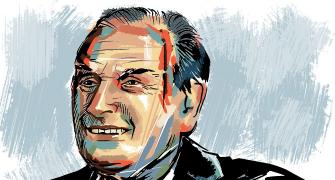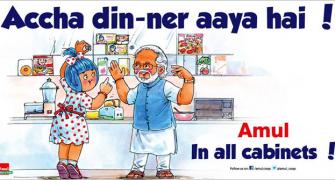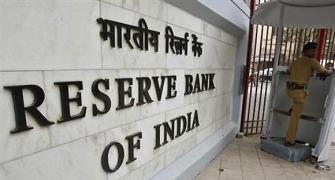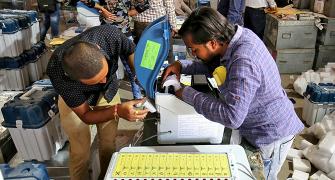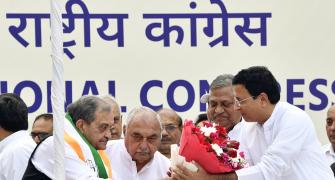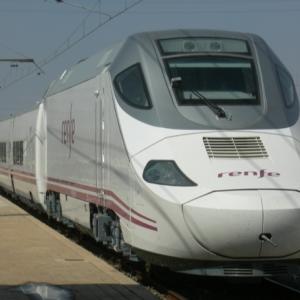Today, they can’t meet even the piffling capital norm set by Mint Road - Rs 5 crore for partnerships and Rs 10 crore for public and private firms in this line of business.
Bulk of the trades are put through e-platform offerings of Reuters, Bloomberg, JPMorgan, Barclays or Deutsche Bank.
And they have the web-based FXall, FXconnect, Atriax, Hotspotfx and LavaFX for company.
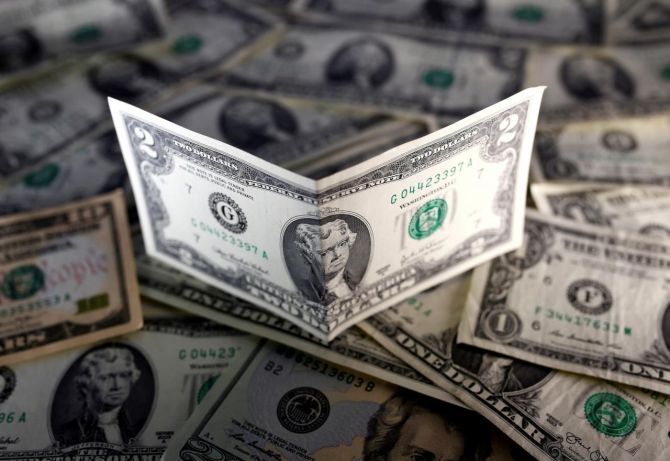
It’s unlikely that you have heard of the Foreign Exchange Brokers’ Association (FEBA), a lobby group of old-world voice-brokers (close cousins of the outcry artistes on the bourses from a bygone era) who, on a good day, would put through a few billion dollars worth of deals between them in the foreign exchange (forex) mart.
Yet today, they can’t meet even the piffling capital norm set by Mint Road - Rs 5 crore for partnerships and Rs 10 crore for public and private firms in this line of business.
Many deadlines have passed, and a new date has been sought.
Sixty-year-old Gautam Ashra, managing partner at Kanji Pitamber & Co, turns wistful as he remembers his grandfather who started the firm in 1933.
“He left this world peacefully, aged 91. But I will not live long like him at the rate I am wining and dining bankers for business.”
The nosedive
Today, the number of forex brokerage firms stand at about 15 - down from 40 five years ago and from 125 in 1998.
Of the daily turnover of $40-odd billion - spot and forwards combined - only about 7 per cent are put through these brokerages.
Six of them - Kanji Pitamber, LC Raheja, Govindram & Sons, FR Ratnakar, SAK Forex, and Mecklai & Mecklai - account for 60 per cent of this small pie.
The brokerage itself is nothing to crow about.
For spot trades, it’s Rs 550 for a million dollars, down from the Rs 750 a year ago; in the forwards, you earn Rs 650 against Rs 1,000 last year.
“Some of us go through $100 million in trades a day, but hardly pocket anything,” wails Ashra.
Globally, too, a handful of forex brokers call the shots: Tullet Prebon, Icap or Exco.
The bulk of the trades are put through e-platform offerings of Reuters, Bloomberg, JPMorgan, Barclays or Deutsche Bank.
And they have the web-based FXall, FXconnect, Atriax, Hotspotfx and LavaFX for company.
Parag Mehta, managing partner at F R Ratnakar & Co, says it is high time the practice of paying global platforms in dollars is done away with.
“Whether you buy a BMW or an iPhone, you pay in rupees out here. How is brokerage different? These platforms are not exporting anything, but still banks pay them in dollars, while we get paid in rupees,” says Mehta, also the chairman of FEBA.
It’s a reference to the fact that a weaker rupee or higher volumes does not lead to higher earnings.
It’s also another way of saying that these firms should also be allowed to be paid in dollars.
Moreover, Mehta has an issue with the capital norm of Rs 5 crore: “I am not into an assets business. Nor am I part of the settlement system.
"You can set up an equity brokerage with Rs 1 crore in capital.”
Ironically, the lifeline for the many vintage forex brokerage firms is an archaic Reserve Bank of India (RBI) regulation.
In the aftermath of the Harshad Mehta scandal, it was laid down that no bank could put through more than 5 per cent of its business through a specific money and securities dealer.
It was not meant to be for forex brokerages, but to be on the safe side and due to lack of regulatory clarity, the same principle came into play - not 5 per cent but, say, not more than 10-15 per cent to a single entity.
But this lifeline is going to be cast away soon.
State Bank of India’s (SBI) move to merge its associate banks has meant a smaller fee-pool.
If more state-run banks were to consolidate, it will get more crowded at the watering hole.
And banks can arm-twist to get even better pricing.
“Banks get volume discounts of almost 50 per cent even if they lose on the fine rates offered by brokerages. It helps them trim their expense account,” points out Ashra.
Backstory to the future
The first blow to the business was the centralisation of bank treasuries in the late 1990s.
When SBI shifted its treasury to Mumbai, it killed Kolkata’s forex brokers.
The same thing happened when banks in New Delhi and Chennai did so.
But the death knell came in 1998, when brokerage fee was opened even as Reuters came in with an e-spot broking interface.
As to whether these moves were “timed” is something we will never know, but that’s the backstory.
The future will mirror whatever the trend is, worldwide.
Tullett & Riley merged with Liberty Brokerage to create Tullett Liberty in 1999.
Four years later, it was in the belly of Collins Stewarts - Collins Stewart Tullett. In 2004, it was the turn of Prebon Yamane, born in 1990, to form a three-way merger of the London-based money brokers - Babcock & Brown, Kirkland-Whittaker and Fulton Prebon.
They now hire hundreds of dealers, and have added money markets, bonds and gilts broking to their bouquet.
Little wonder that Ashra quips: “If I get a good deal, I too will sell out.”
Photograph: Dado Ruvic/Reuters


